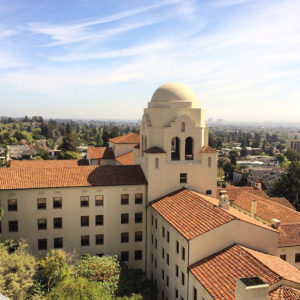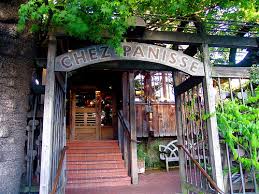Tag: Berkeley engineering
Let There Be Light podcast explores identity at UC Berkeley — through housing, microchips, and the Berkeley food scene
Announcing Season 4 of the Berkeley Remix podcast!
This season of the Berkeley Remix we’re bringing to life stories about our home — UC Berkeley — from our collection of thousands of oral histories. Please join us for our fourth season, Let There Be Light: 150 Years at UC Berkeley, inspired by the University’s motto, Fiat Lux. Our episodes this season explore issues of identity — where we’ve been, who we are now, the powerful impact Berkeley’s identity as a public institution has had on student and academic life, and the intertwined history of campus and community.
The three-episode season explores how housing has been on the front lines of the battle for student welfare throughout the University’s history; how UC Berkeley created a culture of innovation that made game-changing technologies possible; and how political activism on campus was a motivator for the farm-to-table food scene in the city of Berkeley. All episodes include audio from interviews from the Oral History Center of The Bancroft Library.
Episode 1. Sleeping with the Light On: Housing and Community at Berkeley
Written and produced by historian Amanda Tewes, UC Berkeley Oral History Center
“From early housing cooperatives during the Great Depression, to fights for racial and gender parity on campus, housing has been on the front lines of the battle for student welfare throughout the University’s history.”

We’ve come to think of communal living as a tradition for students, a rite of passage and a valuable lesson in community building. But for much of its history, UC Berkeley didn’t even have residence halls! In this episode, we explore what home and community has meant to students at Cal, and how accessible spaces have supported social justice movements on and beyond campus.
This episode includes audio from the Oral History Center of The Bancroft Library, including Rev. Allen C. Blaisdell, Jackie Goldberg, Frank Inami, Marguerite Kulp Johnston, Edward V. Roberts, and Dorothy Walker. Voiceover of Ruth Norton Donnelly’s interview by Shanna Farrell. Audio from the “Which Campus?” video courtesy of The Bancroft Library. (Written version of Sleeping with the Light On.)
Episode 2. Berkeley Lightning: A Public University’s Role in the Rise of Silicon Valley
Written and produced by historian Paul Burnett, UC Berkeley Oral History Center
“We’re used to hearing about how game-changing technology makes whole new ways of living and working possible. But what makes the game-changing technologies possible? UC Berkeley — a public, state university — established institutions and teams that would make the culture of innovation possible.”

“Berkeley Lightning” is about the contributions of UC Berkeley Engineering to the rise of the semiconductor industry in what became known as Silicon Valley in the 1960s and 70s. In contrast to the influential entrepreneurial spirit of a private university like Stanford, Berkeley’s status as a public institution had a different impact on Silicon Valley. We focus on the development of the first widely used design program for prototyping microchips. Originally designed by and for students, the software spread like lightning in part because Berkeley, as a public institution, made it available free of charge. The world has not been the same since.
This episode includes audio from the Oral History Center of The Bancroft Library, including Paul R. Gray, Professor of Engineering Emeritus, Department of Electrical Engineering and Computer Science and Dr. Laurence Nagel, CEO Omega Enterprises, PhD from UC Berkeley EECS, and former senior manager at Bell Laboratories (oral history forthcoming). (Written version of Berkeley Lightning.)
Episode 3. Berkeley After Dark
Written and produced by interviewer Shanna Farrell, UC Berkeley Oral History Center
“What Alice Waters and the Chez Panisse team did was probably the most radical gesture in restaurants and cooking in America in the last century. It’s important that it happened in Berkeley.” — Chef Christopher Lee

Berkeley After Dark is about the connection between the history of farm-to-table eating and the campus community. UC Berkeley alum Alice Waters helped pioneer the concept of eating local, seasonal, and organic food at her restaurant, Chez Panisse, located just a few blocks from campus on Shattuck Avenue. This grew out of her combined love of feeding people and political activism, and evolved into a culinary revolution. And it couldn’t have happened without UC Berkeley. The intertwined history between campus and the community gave Chez Panisse an audience, and a workforce, creating a symbiotic relationship.
This episode includes audio from the Oral History Center of The Bancroft Library, including Christopher Lee, Narsai David, and Dylan O’Brien. Voiceover of Marion Cunningham’s interview by Amanda Tewes and Paul Bertolli’s interview by John Fragola. Supplemental interviews with Chris Ying. (Written version of Berkeley After Dark.)
Over the decades, the Oral History Center has conducted 4,000 interviews on almost every topic imaginable. As part of UC Berkeley’s commitment to open access, the transcripts are available to researchers and the public at no cost, and almost all of the transcripts are available online. Search our vast collection.